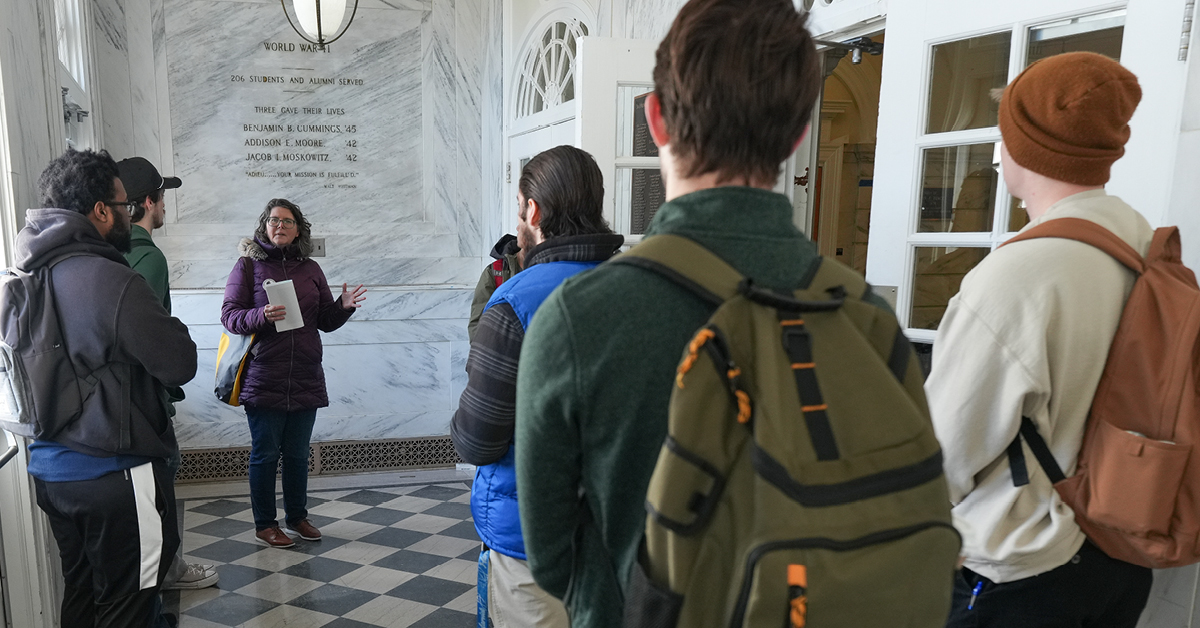‘The History of Now’: In history course, a deep dive into Rowan’s first century
‘The History of Now’: In history course, a deep dive into Rowan’s first century

The 107 Glassboro residents who purchased the land to establish a normal school to train teachers in South Jersey definitely impressed Nia Lloyd.
But that’s not all.
There’s also the Hollybush Summit, where President Lyndon B. Johnson and Soviet Premier Alexei Kosygin hunkered down on campus for important talks at the height of the Cold War.
There’s Operation Uganda, in which students joined together to support a newly independent nation by gathering books and supplies for classrooms in Africa.
And, of course, there’s Henry Rowan, whose $100 million gift transformed the institution.
“He was asked for $1,500 and he said, ‘What would you do with $100 million?’” Lloyd said, marveling at Rowan’s humility and vision.
Rowan University’s proud history is incredible, Lloyd said. But if not for “The History of Now,” a course focusing on Rowan’s first 100 years, she doubts she ever would have known the nuanced stories of the University’s past.
“It’s been very interesting to see the evolution of the University and the campus,” said Lloyd, a sophomore biological sciences major who grew up in Sewell. “I’m impressed by the sheer number of things that have been accomplished here.
“It’s very important to know our history. It helps us see how we can move forward.”
History's relevance to today's students
That’s one of the goals of the course, according to History Professor Emily Blanck, who has taught two sections of the class this spring and last fall. The three-credit course’s title—“The History of Now”—speaks to how history is relevant to today’s students, Blanck said.
“We want them to think about the past and, also, think about how the past impacts them today,” said Blanck, who co-taught the class with fellow historian Debbie Sharnak in the fall, but is teaching it solo this spring.
“The course introduces students to the importance of history in today’s world, allows them to explore how history is made and encourages them to develop deep analytical skills.”
Moreover, Blanck noted, the course uses the University’s rich past as a starting point for students to examine local, national and international historical events while understanding their own place in history.
With a number of guest speakers, a grand tour of campus, and research in the Rowan archives, the class explores topics including the history of higher education, the Depression and the New Deal, civil rights, the Vietnam War, the Cold War, collegiate sports and philanthropy.
Guest speakers have included three Rowan history professors: Jessica Mack, who discussed digital history; Kelly Duke Bryant, who presented on Operation Uganda; and Jim Heinzen, who discussed the Hollybush Summit. Additionally, 50-year Law & Justice Studies Professor Stanley Yeldell, who grew up in Glassboro, addressed issues of race, while Assistant Vice President of University Relations Lori Marshall discussed changes to the University after the Rowan gift.
Published in the fall, “100 Years Forward: The History of Rowan University,” a book chronicling the University’s first century, serves as the course textbook with supplemental readings from a variety of sources, including primary source materials culled from the Rowan archives.
A full-time professor since 2008, Blanck estimates she and Sharnak spent 50 hours in the archives preparing materials for the course.
'An understanding of the humanity of the past'
Most impressive to her, she says, is that, while Rowan has been privileged to have strong presidents throughout history, many others made significant contributions. The course highlights those folks as well, Blanck notes.
“Our students are gaining an understanding of the humanity of the past,” says Blanck. “People think of our collective history as the Hollybush Summit and the Rowan gift.
“But there are so many moments and so many interesting people who did some really important things.”
In 1946, Blanck notes, Dean of Women Evelyn Reade deftly faced the issue of racial segregation in the institution’s residence halls. Reade used “reverse integration”—having white students and Black students live together in formerly all-Black dormitories—to fully integrate campus housing within two years.
“One of our students highlighted that in his research, which was great,” Blanck says.
Blanck also is impressed with Betty Bowe Castor, a 1963 alumna who was a driving force behind Operation Uganda, and David Tarr, a 1965 alumna, who returned to campus in the fall to present “How to Save the Planet” as part of a Centennial Lecture Series program.
Castor’s storied career includes serving as a teacher in Uganda and the U.S., as Florida’s commissioner of education, as a member of the Florida Legislature and as president of the University of South Florida.
Former lead economist for the World Bank, Tarr has provided advice to government on a wide range of international policy trade issues in 30 countries. He formerly was a senior economist at the U.S. Federal Trade Commission.
“Betty Bowe Castor was a regular student. David Tarr was as well. They were able to turn their teaching degrees into something pretty remarkable. That’s a great lesson for students,” says Blanck. “It has been really fun to teach this course.”
Lloyd says it’s a course she’d recommend for all Rowan students.
“I think incoming freshmen should take it,” she said. “Honesty, I think a course like this should be offered at every college nationally.”